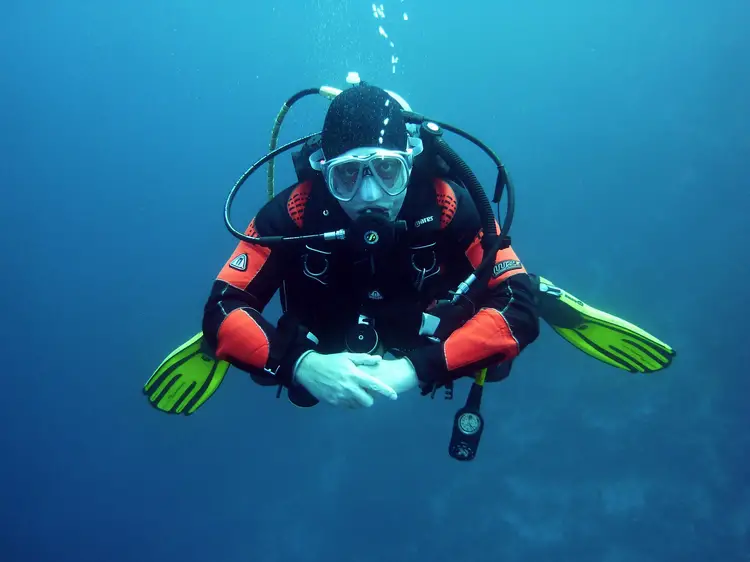
A normal person can do scuba diving, provided they are in good health and have the proper training and equipment. Scuba diving can be enjoyed by people of all ages and fitness levels, and there are various levels of certification available to cater to different skill levels.
However, before going scuba diving, it is important to ensure that you do not have any medical conditions that could put you at risk while diving, such as heart or lung problems. You may need to complete a medical questionnaire or undergo a medical examination to determine if you are fit for diving.
Additionally, it is essential to receive proper scuba diving training from a certified instructor and to use appropriate equipment. Diving without proper training or equipment can be dangerous and even life-threatening. So, if you are interested in scuba diving, make sure to enroll in a reputable scuba diving course and always follow safe diving practices.
Can everybody do scuba diving?
While scuba diving is a popular recreational activity that can be enjoyed by people of different ages and backgrounds, not everyone can do it. Certain medical conditions, such as heart or lung problems, can make scuba diving unsafe, and it’s essential to undergo a medical evaluation to ensure that you are fit for diving.
Additionally, scuba diving requires a level of physical fitness and swimming proficiency, and some dive sites may have specific requirements or limitations. For example, certain dive sites may require a higher level of certification or experience, while others may have depth or current restrictions.
It’s important to receive proper training from a certified instructor and to always follow safe diving practices to minimize the risk of injury or accident while diving. So, while not everyone can do scuba diving, it is possible for most people to enjoy this exciting activity with the right training and preparation.
Who Cannot do scuba diving?
There are several medical conditions that may prevent someone from scuba diving. Some of the most common conditions that may make scuba diving unsafe include:
- Lung problems: Any condition that affects the lungs, such as asthma, emphysema, or chronic bronchitis, can make it difficult to breathe while diving and increase the risk of lung injury.
- Heart problems: People with heart conditions, such as coronary artery disease or a history of heart attack, may be at increased risk of cardiac events while diving.
- High blood pressure: Uncontrolled high blood pressure can increase the risk of serious complications such as bleeding in the lungs or brain while diving.
- Ear problems: People with a history of ear infections, ruptured eardrums, or ear surgery may experience pain or damage to the eardrum while diving.
- Pregnancy: Pregnant women should not scuba dive as there is a risk of harm to the fetus.
- Medications: Certain medications, such as some allergy medications, can cause drowsiness and affect a diver’s judgment and coordination.
Before scuba diving, individuals are required to fill out a medical questionnaire or undergo a medical evaluation to assess their fitness for diving. If you have any medical conditions or concerns, you should consult a physician before attempting to scuba dive.
Can you scuba dive even if you can’t swim?
It is not recommended to scuba dive if you cannot swim. Scuba diving involves being in an underwater environment, which can be unpredictable and potentially dangerous. If you cannot swim, you may not be able to move efficiently in the water or respond appropriately to unexpected situations that may arise while diving, which can put you and your dive buddy at risk.
Most scuba diving certification courses require that you demonstrate basic swimming proficiency, such as being able to tread water for a certain amount of time and swim a certain distance without stopping. These skills are important for your safety and the safety of others while diving.
If you are interested in scuba diving but cannot swim, it is recommended that you take swimming lessons first to gain the necessary skills and confidence in the water before attempting to scuba dive.
Additionally, there are some diving programs that are specifically designed for non-swimmers, such as “Discover Scuba Diving” programs that take place in a pool or shallow water with a certified instructor. However, even in these programs, it is important to have some basic swimming skills and comfort in the water to ensure a safe and enjoyable diving experience.
Can beginners scuba dive?
Beginners can scuba dive, but they must undergo proper training and certification to ensure their safety and that of others. Scuba diving is an activity that requires specific knowledge and skills, and it is essential to receive proper training from a certified instructor before attempting to dive.
There are different levels of scuba diving certification, from beginner to advanced levels, and each level involves progressively more complex skills and knowledge. Beginner scuba diving courses typically include classroom sessions, pool training, and open water dives to teach the fundamentals of scuba diving, such as safety procedures, equipment use, and basic diving techniques.
It is important for beginners to choose a reputable scuba diving center or school to receive proper training and certification. By enrolling in a recognized scuba diving course, beginners can learn the necessary skills and knowledge to dive safely and confidently, and gain a better appreciation of the underwater environment.
Remember that safety should always be the top priority when scuba diving, and beginners should never attempt to dive beyond their training and experience level. With the right training, equipment, and mindset, beginners can enjoy the exciting and rewarding experience of scuba diving.
Why some people can’t scuba dive?
There are several reasons why some people may not be able to scuba dive:
- Medical conditions: Certain medical conditions, such as heart or lung problems, may make scuba diving unsafe. People with conditions that affect breathing or circulation may be at increased risk of injury or complications while diving.
- Age: Scuba diving has age restrictions, and some dive operators may require a minimum age for participation. The minimum age for scuba diving varies depending on the certification agency and the type of course.
- Physical fitness: Scuba diving requires a certain level of physical fitness, and some individuals may not be able to meet the physical demands of diving. For example, individuals with mobility issues or physical disabilities may find it difficult to move and control their buoyancy while underwater.
- Fear or anxiety: Some people may have a fear of water or experience anxiety in underwater environments, which can make scuba diving challenging or unpleasant.
- Lack of training or experience: Scuba diving is a technical activity that requires specific knowledge and skills, and individuals who lack proper training or experience may not be able to scuba dive safely.
It is important for individuals to undergo a medical evaluation and receive proper training and certification before attempting to scuba dive. If you have any medical conditions or concerns, you should consult a physician before attempting to scuba dive.
Can you go diving with no experience?
It is not recommended to go scuba diving with no experience. Scuba diving is an activity that involves specific knowledge and skills, and it is essential to receive proper training from a certified instructor before attempting to dive.
Without proper training and experience, scuba diving can be dangerous and even life-threatening. Scuba diving involves being in an underwater environment, which can be unpredictable and potentially hazardous if the diver is not properly trained to manage the risks and challenges that may arise.
Most scuba diving centers or schools offer beginner scuba diving courses, which typically include classroom sessions, pool training, and open water dives to teach the fundamentals of scuba diving, such as safety procedures, equipment use, and basic diving techniques. These courses are designed to provide a safe and structured environment for beginners to learn and practice the necessary skills and knowledge to dive safely and confidently.
If you are interested in scuba diving but have no experience, it is recommended that you enroll in a beginner scuba diving course to receive proper training and certification. By learning the necessary skills and knowledge, you can enjoy a safe and rewarding diving experience.
I hope you enjoyed this article about can a normal person do scuba diving?
I’d love to hear from you. Tell us about your adventures of diving and snorkelling. Please use the comments section below. Please also share your photos. Either from your underwater cameras or videos from your waterproof go-pro’s!
But in particular if you’ve dived either in the Maldives or in particular on the Maldives Emperor Voyager liveaboard, please share your experiences.
If this article hasn’t answered all of your questions. If you have more questions either about snorkelling or scuba diving (or specifically about can a normal person do scuba diving), please comment below with your questions.
There will also be many more articles about scuba and scuba diving safety tips (and on snorkelling too) for you to read and learn about this fabulous sport.




